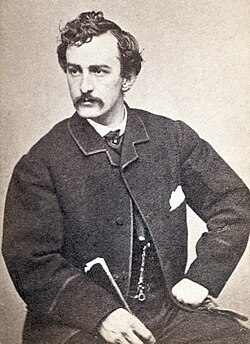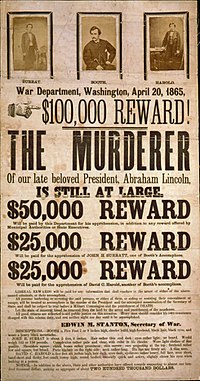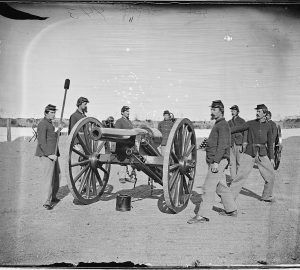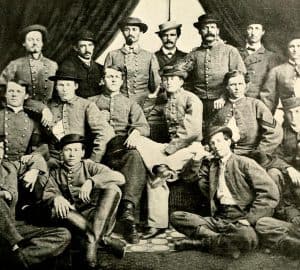
With the Civil War quickly winding down to a close in April, 1865, President Abraham Lincoln began to look ahead towards reconstructing the south and bringing the country back together. On April 11, he gave a speech from the balcony of the White House in celebration of the recent victories by the Union armies. He spoke in support of voting rights for the former slaves, and in supporting the loyal government that had been from in Louisiana. It would be the last public speech he would ever give, and there was a man in the crowd who would make it so – John Wilkes Booth.

Booth was a famous actor, who had performed in several plays that Lincoln had attended. He had southern sympathies, and had already gathered a group of conspirators and was planning for months to kill or kidnap Lincoln, and several other high ranking government officials. He was furious that the president was pushing for black suffrage, and later wrote in his diary, “Our cause being almost lost, something decisive and great must be done.” Around noon on April 14, 150 years ago today, Booth stopped by Ford’s Theater in Washington, where his mail was delivered, and learned that Abraham Lincoln, Ulysses S. Grant, and their wives, would be attending that night’s performance of Our American Cousin. He decided that, as he was familiar with the building, this would be the time to strike. He met with his fellow conspirators that evening to go over their plans, which would be executed at 10 pm. Lewis Powell was assigned to kill William Seward, Secretary of State, George Atzerodt would kill Andrew Johnson, the vice-president, and David Herold would assist in the escape.

Those around Lincoln that day noted that he seemed unusually happy. Victory was in his sights, and as one senator wrote, “That indescribable sadness … had been suddenly exchanged for an equally indescribable expression of serene joy as if conscious that the great purpose of his life had been achieved.” The Lincoln party arrived at the play late. The Grants had not come, as Julia Grant did not get along with Mary Lincoln, and Major Henry Rathbone and his fiancée Clara Harris came instead. When they entered the presidential box, the performance was stopped and the band played Hail to the Chief.

Booth approached the box around 10:30. The guard stationed to guard it was absent, and since Booth was a celebrity, the usher let him in. The assassin waited for a moment until the funniest moment of the play, hoping the laughter would cover the gunshot. With the theater filled with laughter, Booth fired directly into the president’s head, mortally wounding him. Mrs. Lincoln screamed, and Rathbone struggled to restrain Booth. Booth dropped his gun and drew a knife. Stabbing Rathbone, he was able to break free and jump the twelve feet down onto the stage. He caught on a decorative flag and landed hard, breaking his leg in the process. As he strode across the stage, he shouted, “Sic semper tyrannis,” (meaning thus always to tyrants), and “the south is avenged,” or something to that effect, depending on which eyewitness you choose to believe. It took a moment for the audience to realize that this was not part of the play, and in the mean time Booth escaped, stabbing the orchestra leader in the process.

Doctors soon attended to Lincoln, but they found him in very bad way. He was unconscious, and barely breathing. He was carried to the Peterson House across the street. All the doctor’s efforts to save the president were unsuccessful, and he died at 7:22 the next morning.
Although Booth was tragically successful, his fellow conspirators were not. Powell gained entrance to William Seward’s house. He attempted to shoot Federick Seward, William’s son and the assistant secretary of state, but the gun misfired. Instead he hit him on the head with it, knocking him unconscious. He then ran into the Secretary of State’s room and stabbed at him wildly, but failed to hit anything vital. Several other people ran into the room, Powell pushed and sliced his way through them, shouting, “I’m mad! I’m mad!” and escaped on horseback. George Atzerodt, who was to kill Johnson, went to the hotel where he was staying, but he did not get up the nerve to attack him. Instead he got drunk at the hotel bar, and wandered the streets.

A massive manhunt was begun to find Booth. He fled through Maryland into Virginia, and was eventually discovered at the Garrett farm. Soldiers of the 16th New York Cavalry found him in a barn with David Herold. When the soldiers challenged them, Herold agreed to surrendered, but Booth remained defiant. The Federal soldiers set the barn on fire, and Booth ran out the door, with a rifle in one hand and a pistol in the other. Although the soldiers had been ordered to take him alive, Sergeant Boston Corbett ran up behind Booth and shot him. He died two hours later.
The rest of the conspirators were arrested, as well as several other people including Booth’s brother, the doctor who set his leg, and the owner of the theater. Eventually eight people were tried in a military tribunal ordered by Andrew Johnson, who had assumed the presidency. He justified his choice of a military tribunal by arguing that in killing the president they had acted as agents of the Confederate government. In the tribunal someone could be convicted with a simple majority, and there was no appeal except to Johnson. After several weeks of trial, all the defendants were found guilty. Lewis Powell, David Herold, George Atzerodt and Mary Surratt, owner of a boarding house, were sentenced to be hung. Booth’s doctor and two other conspirators who had not participated in the attacks, Samuel Arnold, and Michael O’Laughlen, were sentenced to life in prison. Edmund Spangler, an employee of Ford’s Theater who Booth had asked to hold his horse, was sentenced to six years.

Abraham Lincoln’s death had an drastic impact on the country. He was advocating for a relatively mild course in reconstruction, and with the popularity he had gained by winning the war, it is likely Congress would have gone along with him. With his death, the northern people and government grew angry and wanted to take vengeance on the south. The new president, Andrew Johnson, was much less popular. When he tried to use a light hand on the south, Congress took over reconstruction, and the south remained in turmoil for many years.




